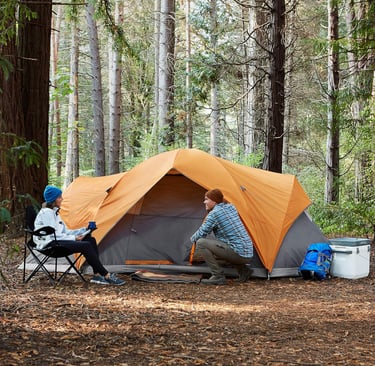The Ultimate Guide to Camping for Wellness: Reconnect, Recharge, and Relax
Camping serves as an effective means to enhance overall well-being by allowing individuals to disconnect from the fast-paced, technology-driven world and immerse themselves in nature
12/6/20249 min read
Introduction:
Embrace Wellness in the Wild
In a fast-paced world dominated by technology and constant connectivity, the importance of stepping away to reconnect with nature cannot be overstated. Camping emerges as a powerful antidote to the stresses of modern life, offering individuals an opportunity to embrace wellness in a tangible and transformative way. By immersing oneself in the great outdoors, camping fosters a unique environment that encourages mental clarity, physical rejuvenation, and emotional balance.
The serene landscapes of forests, mountains, and lakes provide a backdrop that is both refreshing and invigorating. When one retreats into nature, the distractions of daily life fade away, allowing for a deeper exploration of self and surroundings. The act of camping promotes mindfulness, as it encourages individuals to engage fully with their sensory experiences—the sounds of rustling leaves, the aroma of pine, and the sight of stars twinkling in the night sky. This engagement not only enhances one’s appreciation for the natural world but can significantly improve mental health and emotional well-being.
Furthermore, the physical benefits of camping are notable. Activities such as hiking, kayaking, and even simply setting up a tent provide excellent opportunities for physical exercise. The combination of fresh air, sunlight, and physical activity contributes to improved mood and increased energy levels. As people step away from their routine and embrace a slower pace of life, they often find their stress levels decrease significantly, paving the way for a more balanced lifestyle.
Ultimately, camping serves as a holistic approach to wellness, promoting recovery from the daily grind and fostering a deeper connection with oneself and nature. The subsequent sections will explore the various aspects of how camping can enhance overall well-being, encouraging readers to consider this enriching experience as a vital component of their wellness journey.
The Wellness Benefits of Camping
Camping serves as an effective means to enhance overall well-being by allowing individuals to disconnect from the fast-paced, technology-driven world and immerse themselves in nature. Research has shown a strong correlation between reduced stress levels and the time spent outdoors. Indeed, unplugging from digital devices often leads to significant improvements in mental health. A study conducted by the University of Michigan found that participants who engaged in a nature experience exhibited notably lower levels of anxiety and rumination compared to those who remained indoors with their devices.
Moreover, exposure to green spaces has been proven to positively influence mental health. Nature has a calming effect that can enhance one's mood and emotional resilience. The biophilia hypothesis posits that humans possess an innate affinity for the natural world, reinforcing the notion that spending time in nature fosters psychological well-being. The greenery seen in parks and forests can promote a sense of peace and tranquility, thereby reducing symptoms of depression and stress-related disorders. A survey by the National Park Service indicated that 74% of participants felt rejuvenated from their experiences in natural settings.
In addition to mental health benefits, camping often involves various physical activities, contributing to improved physical well-being. Engaging in hiking, swimming, or simply walking in nature promotes cardiovascular health, enhances muscular strength, and encourages physical fitness. A study published in the Journal of Environmental Psychology supports this assertion, indicating that outdoor activities help regulate mood, boost energy levels, and improve self-esteem. Through these outdoor exercises, camping facilitates a connection between mind and body, cultivating a holistic approach to wellness.
In conclusion, the physical and mental health benefits associated with camping illustrate its importance as a wellness practice. By embracing camping as a regular activity, individuals can effectively reconnect with themselves and the environment, while reaping the advantages of reduced stress and improved health.
Planning Your Wellness Camping Trip
Embarking on a wellness camping trip requires thoughtful planning to ensure that the experience fosters relaxation and rejuvenation. Selecting the right location is paramount; choose a site that resonates with your personal preferences, whether it's a serene forest, a coastal area, or a mountainous landscape. Research campsites that offer tranquil surroundings, accessibility to nature trails, and perhaps even proximity to calming water bodies. Such settings not only facilitate physical activity but also contribute positively to mental well-being.
Equipping yourself with the appropriate gear is crucial for a successful wellness camping experience. Essential items include a high-quality tent for restful sleep, sleeping bags rated for the appropriate season, and comfortable camping chairs for unwinding by the campfire. Don’t forget to bring along wellness essentials such as yoga mats for stretching exercises, tools for mindfulness practices like journaling, and perhaps some items for outdoor meditation sessions. Additionally, a biodegradable soap and eco-friendly products align with the sustainability aspect of wellness camping.
Meal preparation during your trip plays a significant role in maintaining wellness. Plan your meals ahead of time, incorporating whole foods that nourish both the body and the mind. Consider packing fresh fruits, vegetables, nuts, and whole grains. It may be beneficial to marinate proteins or pre-cook vegetables at home, making it easier to prepare meals while camping. Cooking over a campfire can enhance the connection to nature and provide a unique dining experience. Furthermore, setting an intention for your trip is an often-overlooked element that can significantly enrich the overall experience. By defining your wellness goals—whether they're to reconnect with nature, practice mindfulness, or spend quality time with loved ones—you can better focus your activities and create a more meaningful camping experience.
Mindfulness and Nature: A Perfect Pair
Engaging with nature offers a unique opportunity to practice mindfulness, allowing campers to reconnect with both the environment and themselves. Achieving mindfulness in a natural setting enhances one’s awareness of the present moment and promotes a range of wellness benefits. Various techniques can be easily incorporated into a camping experience to foster this mindful connection.
One effective method is meditation, which can be practiced amidst the serene sounds of nature. Finding a quiet spot, sitting comfortably, and focusing on the breath can create a meditative state. Campers can visualize the calming elements surrounding them, such as the rustle of leaves or the gentle flow of a nearby stream. By redirecting attention to these sensations, individuals can cultivate a heightened sense of awareness and tranquility. This technique not only reduces stress but also enhances appreciation for one’s surroundings.
Deep breathing techniques further bolster the mindfulness experience when camping. With the fresh outdoor air, campers can practice slow, intentional breaths. Inhale deeply through the nose, allowing the abdomen to expand, and then exhale gently through the mouth. This practice can be particularly therapeutic when one feels overwhelmed or anxious, as it helps to ground the individual in the present moment. The combination of deep breaths and the natural ambiance creates an ideal environment for cultivating a sense of peace.
Furthermore, the concept of forest bathing, or “Shinrin-yoku,” is an enriching mindfulness practice that involves immersing oneself in the forest environment. This practice encourages individuals to walk slowly, take in the sights, sounds, and aromas of the forest, which fosters a deep connection with nature. As people engage with their surroundings in this manner, they often experience improved mental and emotional well-being.
In embracing these mindfulness techniques while camping, individuals can enhance their overall experience, leading to profound relaxation and a greater connection to nature. This harmony between mindfulness and the environment allows for a transformative outdoor experience that nurtures both the mind and the spirit.
Physical Activities to Boost Wellness While Camping
Engaging in physical activities while camping is not only a means of physical fitness but also a pathway to mental rejuvenation. Being in nature provides a unique backdrop for a variety of exercises that contribute to overall wellness. One popular activity is hiking, which offers a holistic workout as it engages multiple muscle groups while also boosting cardiovascular health. Walking along trails encourages mindfulness, enabling individuals to connect more deeply with the natural environment, which can enhance mental clarity and reduce stress levels.
Swimming is another excellent option during camping trips, particularly for those near lakes or rivers. This low-impact exercise is highly effective for cardiovascular health and builds muscle strength. Swimming in natural water bodies can also have a refreshing effect, alleviating mental fatigue and providing a unique opportunity to cool off during hot weather. Moreover, swimming promotes emotional well-being by releasing endorphins, which are known to combat feelings of anxiety and depression.
Incorporating yoga into the camping itinerary offers profound benefits for both body and mind. Practicing yoga outdoors allows for a serene setting that enhances relaxation and encourages deeper breathing. Various poses can be adjusted according to individual fitness levels, making it accessible and enriching for all campers. The act of stretching amidst nature’s tranquillity contributes significantly to reducing tension and improving flexibility and balance.
Lastly, kayaking is an invigorating activity that combines adventure and exercise. Paddling through tranquil waters or navigating small rapids not only strengthens the upper body but also provides a sense of adventure essential for emotional releases. Engaging in physical activities like these during a camping trip helps create a balanced and active experience, fostering a harmonious connection between physical health and mental wellness.
Creating a Connection with Nature
Engaging with nature is an essential aspect of camping that not only enhances the experience but also promotes overall wellness. One effective way to deepen this connection is through journaling. Taking time each day to reflect on your surroundings, thoughts, and feelings can foster mindfulness. Consider recording the sights, sounds, and smells you encounter. This not only serves as a personal narrative of your camping journey but also helps in cultivating gratitude for the beauty of the natural world.
Nature walks are another excellent method to engage with the environment. Whether it’s a gentle stroll along a forest path or a more rigorous hike up a mountain, being active outdoors allows you to absorb the fresh air and stunning landscapes. While walking, pay attention to the varying textures of the leaves, the intricate patterns on tree bark, and the sounds of wildlife. This heightened awareness fosters a profound appreciation for the ecosystem around you, contributing significantly to your mental and emotional well-being.
Stargazing is a unique activity that enables campers to connect with the vastness of the universe. Away from city lights, the night sky offers a mesmerizing display of stars and celestial bodies. Taking a moment to lie back and observe the constellations can inspire awe and wonder, reminding us of our place in the world. Such reflective moments, shared with fellow campers or enjoyed in solitude, can lead to contemplative insights and enhanced relaxation.
Wildlife observation is yet another enriching experience during camping. Observing animals in their natural habitat promotes a deeper understanding of biodiversity, which can be a powerful motivator for environmental stewardship. Bring along binoculars and a field guide to identify different species. Engaging with wildlife fosters a sense of connection to the planet, encouraging you to appreciate and respect all forms of life.
After the Trip: Maintaining Wellness Gains
Camping provides an invaluable opportunity to reconnect with nature, recharge the mind and body, and ultimately enhance overall well-being. However, the challenge often lies in integrating the gains experienced during a camping trip into daily life. To maintain these wellness benefits, it is essential to adopt specific strategies that facilitate a smooth transition back to routine.
One effective method is to incorporate mindfulness practices into everyday life. Mindfulness involves being fully present in the moment and can be easily integrated into various activities. Whether you are commuting, cooking, or simply resting, practicing mindfulness can help reduce stress and anxiety. Consider setting aside a few minutes each day for deep breathing exercises or meditation, allowing you to reconnect with the tranquility experienced while camping.
Engaging in outdoor activities regularly is another practical approach to sustaining wellness. Try to schedule weekly hikes, walks, or bike rides to cultivate a love for the outdoors similar to that felt during your camping adventures. Even small activities, such as gardening or taking your lunch outside, can bring fresh air and nature appreciation into your routine, fostering a sense of serenity and grounding.
Moreover, prioritizing nature appreciation can yield lasting benefits. Develop a habit of visiting local parks or nature reserves, encouraging family and friends to join. Organizing outdoor gatherings or picnics can create an opportunity to share the positive experiences and camaraderie from your camping trip with loved ones, reinforcing the importance of spending time in nature.
Ultimately, recognizing the significance of making outdoor time a regular habit ensures that the wellness journey begun during your camping trip continues to flourish. By mindfully integrating these practices into daily life, you can effectively enhance mental and physical well-being long after leaving the campsite.
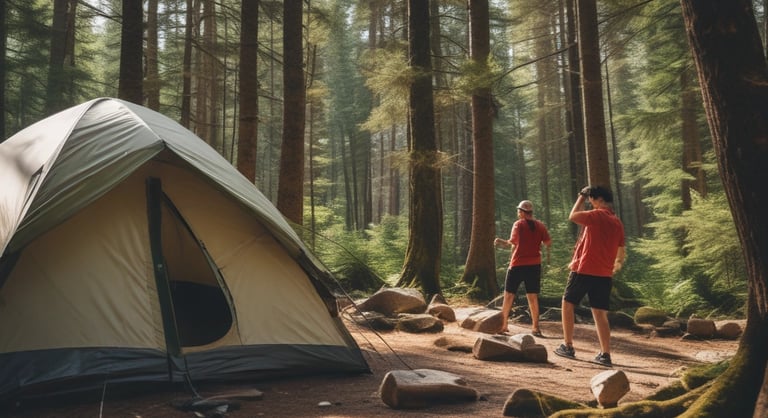

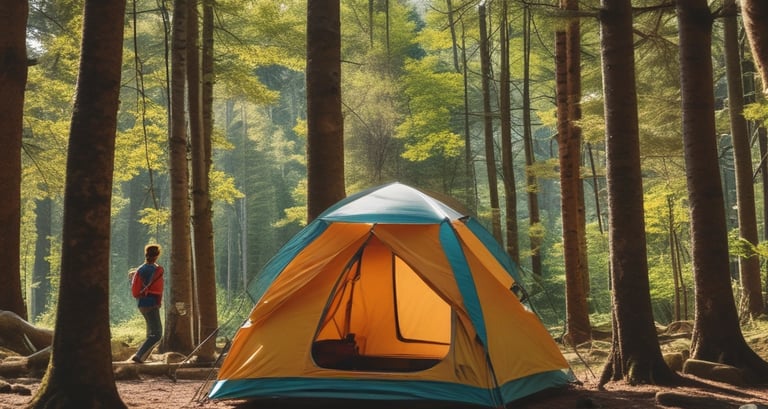



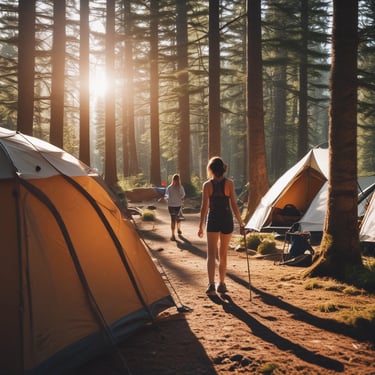
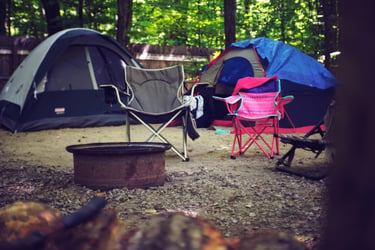
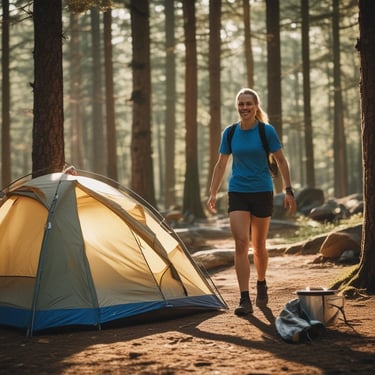
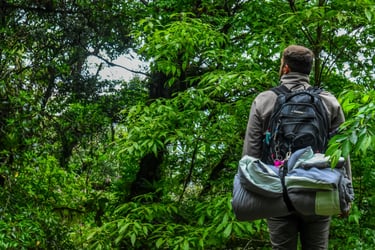
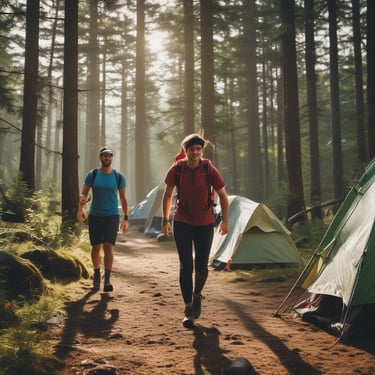
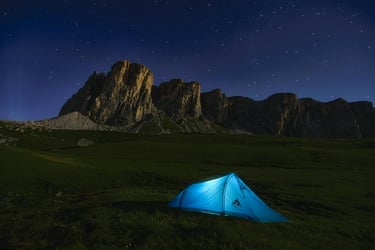
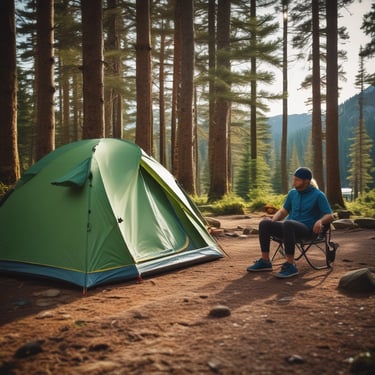
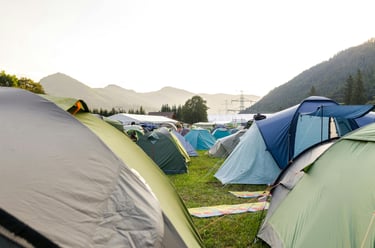








Explore
Inspire your wellness journey while traveling the globe.
Wellness
Travel
+1234567890
© 2024. All rights reserved.






